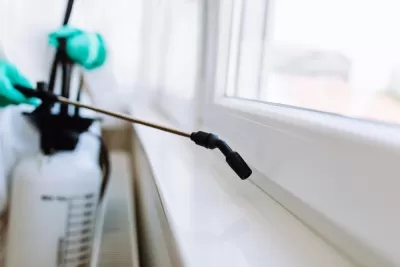For children who have asthma, pests like cockroaches and mice can trigger allergic reactions and lead to recurring and expensive hospital visits. Could insurers save money by investing in housing-based improvements like pest management services?

There’s a connection between one’s home environment and asthma. An array of home-related factors can trigger or worsen asthma: pests such as cockroaches and mice can cause allergic reactions, and secondhand smoke, air pollution, and mold can make it worse. In New York City, children with asthma who are exposed to pests are three times more likely to be hospitalized, and they account for more than two-thirds of asthma-related rehospitalizations annually, according to the city’s Department of Health and Mental Hygiene (DOHMH).
The department recently launched a pilot project to zero in on pest-related pediatric asthma by delivering comprehensive pest management to patients’ homes—and tapping a group of Medicaid health insurers to fund it, even though such nonmedical interventions aren’t typically covered. If the three-year Medicaid Together Improving Asthma Program pilot succeeds in reducing repeat hospitalizations, the insurers should reap returns in the form of direct health care cost savings—but if not, a $1.2 million fund is in place to mitigate any losses.
“The environment in which a person lives directly affects their health,” says DOHMH project manager Beatrice Mauger, launch lead for Medicaid Together. “Our hope is to have a win-win for the health care sector and their clients. That can be achieved if this model shows the health care sector that investing in housing-based improvements can generate sustainable financial benefits.”
Over the years, other programs have worked more generally to tackle home health hazards that could exacerbate asthma, such as the U.S. Department of Housing and Urban Development’s Healthy Homes Program and the National Institute of Food and Agriculture’s Healthy Homes Partnership. At Boston Medical Center...
FULL STORY: Getting Medicaid to Pay for Pest Control

Alabama: Trump Terminates Settlements for Black Communities Harmed By Raw Sewage
Trump deemed the landmark civil rights agreement “illegal DEI and environmental justice policy.”

Planetizen Federal Action Tracker
A weekly monitor of how Trump’s orders and actions are impacting planners and planning in America.

The 120 Year Old Tiny Home Villages That Sheltered San Francisco’s Earthquake Refugees
More than a century ago, San Francisco mobilized to house thousands of residents displaced by the 1906 earthquake. Could their strategy offer a model for the present?

In Both Crashes and Crime, Public Transportation is Far Safer than Driving
Contrary to popular assumptions, public transportation has far lower crash and crime rates than automobile travel. For safer communities, improve and encourage transit travel.

Report: Zoning Reforms Should Complement Nashville’s Ambitious Transit Plan
Without reform, restrictive zoning codes will limit the impact of the city’s planned transit expansion and could exclude some of the residents who depend on transit the most.

Judge Orders Release of Frozen IRA, IIJA Funding
The decision is a victory for environmental groups who charged that freezing funds for critical infrastructure and disaster response programs caused “real and irreparable harm” to communities.
Urban Design for Planners 1: Software Tools
This six-course series explores essential urban design concepts using open source software and equips planners with the tools they need to participate fully in the urban design process.
Planning for Universal Design
Learn the tools for implementing Universal Design in planning regulations.
Clanton & Associates, Inc.
Jessamine County Fiscal Court
Institute for Housing and Urban Development Studies (IHS)
City of Grandview
Harvard GSD Executive Education
Toledo-Lucas County Plan Commissions
Salt Lake City
NYU Wagner Graduate School of Public Service




























